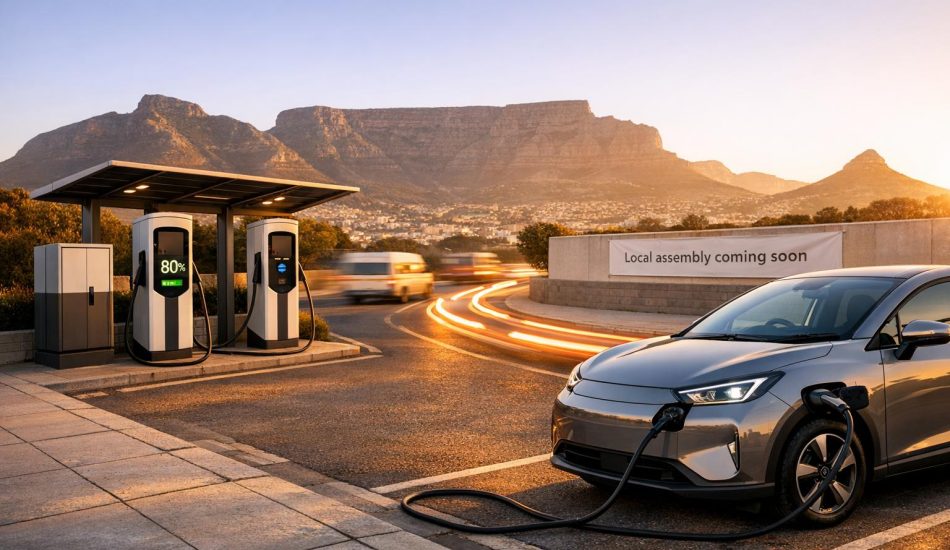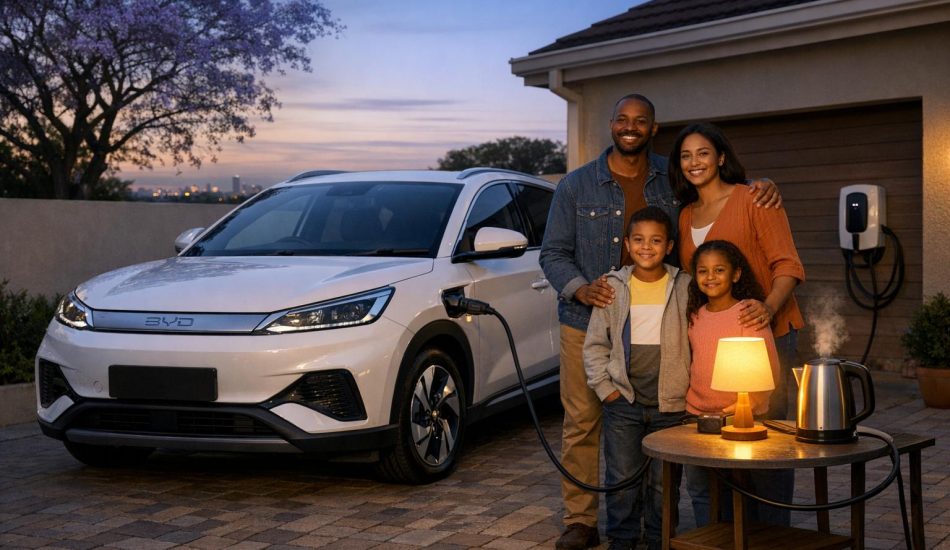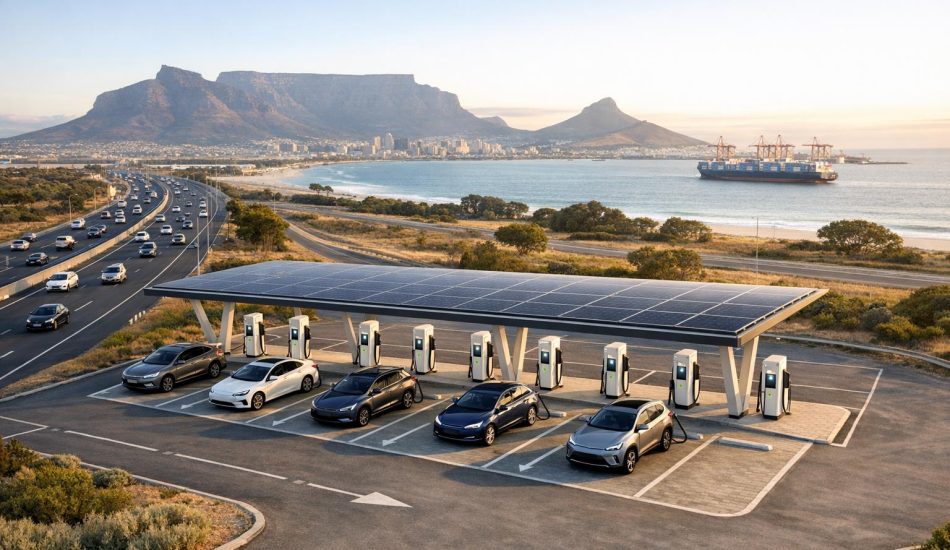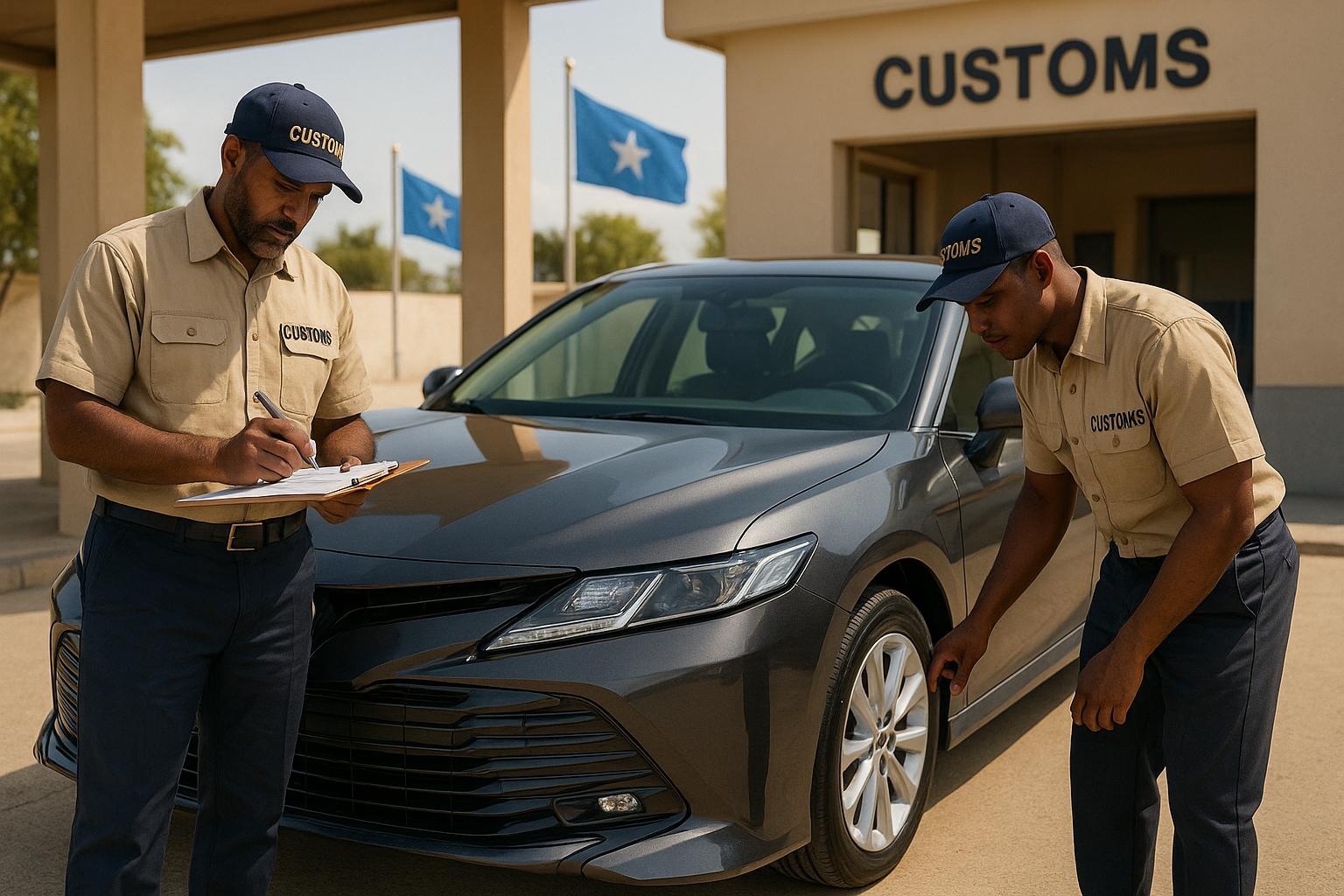
Importing a car into Somalia in 2025? Here’s what you need to know upfront:
- Taxes and Duties: Cars are subject to a 25% import duty, 16% VAT, and 20% excise duty. Combined, taxes can exceed 60% of the car’s value.
- Electric Vehicles (EVs): Taxed the same as gas-powered vehicles. No special exemptions or reduced rates for EVs.
- Age and Emission Standards: Older cars or those failing emission standards face higher tariffs (up to 30%).
- Prohibited Vehicles: Some restrictions apply, such as bans on certain models like Toyota Land Cruiser 4WD pickups in Galmudug.
- Exemptions: Tax waivers are available for humanitarian organizations, infrastructure projects, and eligible individuals like returning nationals.
Key Steps:
- Confirm vehicle compliance with Somali standards (e.g., emissions, steering configuration).
- Gather required documents: sales invoice, export certificate, proof of ownership, and insurance.
- Choose a shipping method: Roll-on/Roll-off (RoRo) or container shipping.
- Clear customs at ports like Mogadishu, Berbera, or Bosaso.
Pro Tip: Hiring a customs broker can simplify the process and help avoid delays. Platforms like EV24.africa also assist with EV imports, offering services like customs clearance and registration.
Importing a car into Somalia requires careful planning, proper documentation, and an understanding of local regulations. Whether it’s a gas-powered vehicle or an EV, preparation is key to avoiding unnecessary costs and complications.
How to Import Cars into Somalia: Step-by-Step Process
Bringing a car into Somalia involves navigating a series of steps, from ensuring the vehicle meets local regulations to clearing customs at designated ports. By understanding the process, you can sidestep delays and unexpected expenses. Here’s a breakdown of what you need to know.
Vehicle Requirements and Compliance Rules
Start by confirming that the vehicle aligns with Somalia’s technical standards. This includes checking the steering configuration, ensuring it meets emission standards, and verifying any restrictions on the vehicle’s age. Some vehicles, especially luxury or high-performance models, may require special permits and could incur higher duties. Additionally, there may be limits on engine size or performance specifications. Once the vehicle’s compliance is confirmed, gather the necessary documents for import.
Import Documents You Need
Accurate documentation is critical. Begin with the sales invoice, which should include the purchase price, Vehicle Identification Number (VIN), and seller details. If the car was purchased from a dealer, you may need a copy of the dealer’s business license. For private sales, a notarized bill of sale might be required.
You’ll also need export clearance from the country of origin. This involves obtaining an export certificate from local customs authorities and any other paperwork verifying the vehicle’s roadworthiness. Make sure to have active shipping insurance, and if the car is financed, be prepared to provide proof of financing.
Technical documents are equally important. These may include a manufacturer’s certificate of conformity, detailing the engine specifications, emissions, and safety features. For used cars, maintenance records or certificates for any modifications can be helpful to ensure smooth processing.
Shipping and Customs Process
Somalia’s main ports – Mogadishu, Berbera, and Bosaso – handle the bulk of vehicle imports. The choice of port usually depends on the shipping route and the car’s final destination within Somalia.
Decide between Roll-on/Roll-off (RoRo) or container shipping based on your needs. Upon arrival, customs clearance begins immediately. All submitted documents must match the vehicle, and the car must meet Somalia’s import standards.
To simplify the process, consider hiring a customs broker. Brokers can assist with calculating duties, managing tax payments, and coordinating with port authorities. After paying the necessary duties and taxes, customs will issue final clearance and temporary registration, completing the import process.
Import Taxes, Duties, and Fee Waivers
When importing vehicles into Somalia, understanding the associated fees and potential waivers is crucial for managing costs effectively. Once your shipment clears customs, the next step involves addressing the taxes and fees that will influence your final expenses.
Import Duties and Additional Charges
Somalia applies various fees to imported vehicles, including an import duty and other applicable charges. However, preferential tariffs are available under regional trade agreements. For example, vehicles originating from East African Community (EAC) member countries like Kenya, Ethiopia, and Uganda may benefit from reduced or zero tariffs under the COMESA framework.
Tax Exemptions for Eligible Groups
Certain importers can qualify for tax relief or even complete exemptions. For instance, United Nations agencies and other humanitarian organizations enjoy full tax exemptions for vehicles used in humanitarian operations, as outlined in Article No. 14 of Somalia’s 1960 customs law. Non-governmental organizations (NGOs) engaged in similar humanitarian efforts can also qualify, provided they notify the relevant authorities and submit required documentation, including annual budget plans and operational reports.
To secure duty-free status, these organizations must submit exemption request letters to both the Ministry of National Planning (MoNP) and the Ministry of Finance (MoF). Supporting documents, such as the Bill of Lading and a non-commercial invoice, are also required. Once the MoNP approves the request, it forwards the authorization to the MoF, which then instructs customs to issue the appropriate clearance.
In addition to humanitarian organizations, development projects focusing on large-scale infrastructure, energy, or reconstruction efforts may also be eligible for reduced or waived duties. Starting the exemption application process well in advance of shipping is highly recommended to ensure timely clearance.
Banned Vehicles and Approved Models
Knowing which vehicles are allowed or restricted for import into Somalia can save you from unnecessary expenses and headaches. Somalia’s 2025 regulations focus more on broad import restrictions rather than targeting specific vehicle models, making it essential to understand the rules before making a purchase.
Prohibited Vehicle Types
Somalia does not limit the age of imported vehicles, meaning you can bring in used cars regardless of their manufacturing year. However, the country does enforce bans on items deemed hazardous or unsafe. For instance, imports of radioactive materials, industrial, pharmaceutical, and chemical waste, as well as gambling equipment, are strictly prohibited.
Additionally, Somalia permits left-hand-drive vehicles, opening the door to imports from markets like the United States and Europe.
Vehicles Approved for Import
Despite some restrictions, most vehicles meet Somalia’s import guidelines. Standard passenger cars, commercial vehicles, and trucks – whether new or used – are generally eligible for import. This flexibility applies to vehicles from major automotive markets worldwide.
Electric and hybrid vehicles also qualify under these regulations. However, it’s crucial for importers to have all required documentation, including proof of ownership and valid export certifications, to comply with local safety and regulatory standards.
For a comprehensive list of prohibited items that could impact vehicle imports, visit the Somali Bureau of Standards (SOBS) website, which provides the most up-to-date information on general import restrictions.
sbb-itb-99e19e3
Electric Vehicle Import Rules and EV24.africa Services
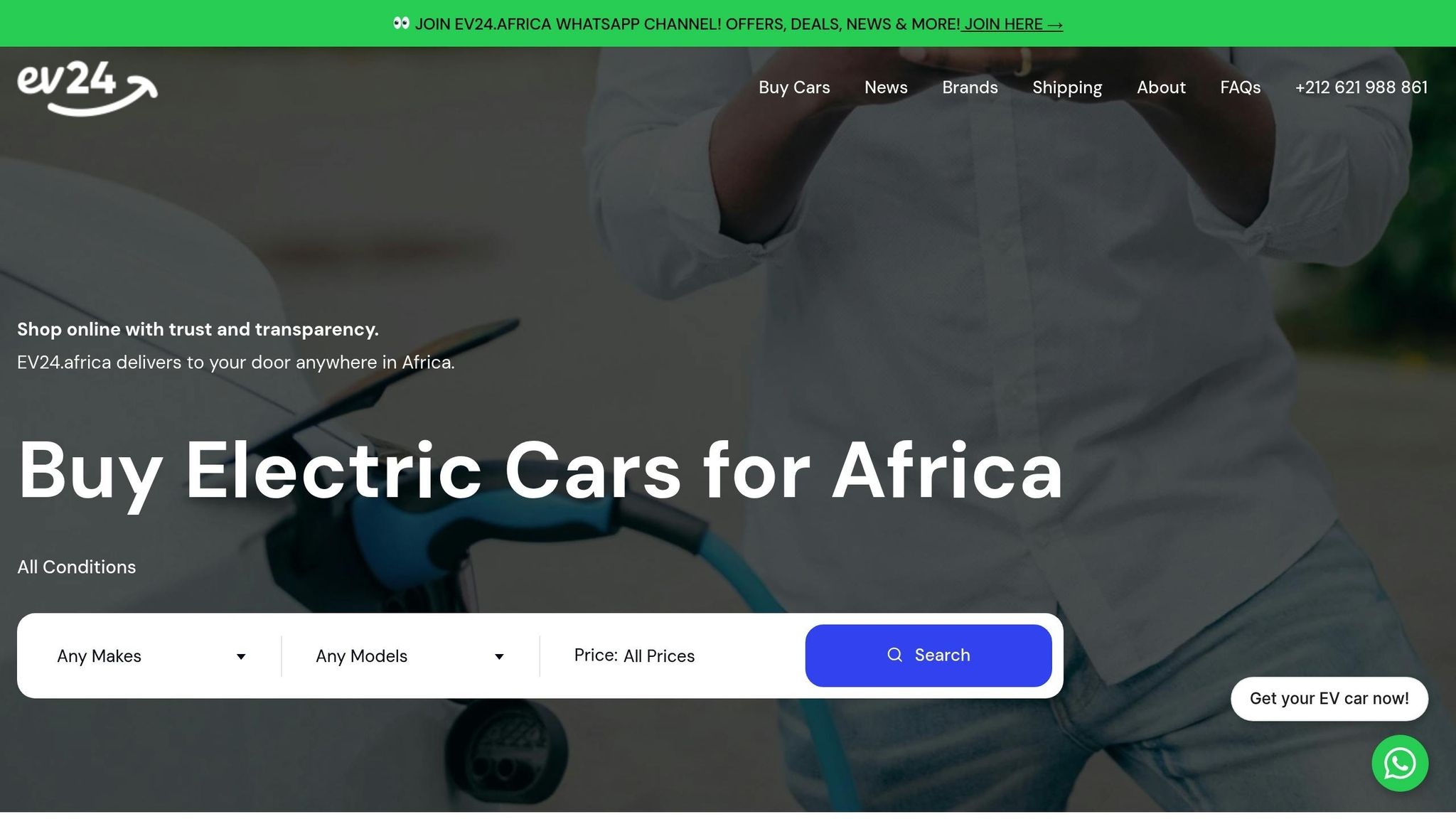
Bringing electric vehicles (EVs) into Somalia involves the same general import requirements as traditional cars. However, there are unique factors that buyers should consider when it comes to EV ownership and importation.
Electric Vehicle Import Requirements
Electric vehicles follow the same documentation, customs processes, and tax structures as regular vehicles. Currently, there are no special exemptions or reduced duties for EVs in Somalia.
That said, Somalia’s limited electricity access – estimated at just 40% – can pose challenges for charging and overall usability. Additionally, the lack of established regulations for battery disposal raises concerns for long-term ownership. Importers should ensure their vehicles meet standard safety requirements and confirm that the charging systems are compatible with the local infrastructure to avoid post-import complications.
These factors underscore the importance of having expert assistance when navigating the EV import process.
EV24.africa Buyer Support Services
To help buyers overcome these challenges, EV24.africa provides end-to-end support for importing electric vehicles into Somalia. Their services cover everything from customs clearance to local registration, making the entire process smoother and more manageable.
"At EV24.africa, we simplify the process of importing and buying electric vehicles in Africa. Our expertise ensures a seamless, transparent, and stress-free experience, so you can focus on driving the future of mobility. From customs clearance to local registration, we handle everything to ensure a smooth import process."
– EV24.africa
EV24.africa also addresses EV-specific needs by offering clear, upfront pricing and optimized shipping options. For instance, vehicle prices range from the budget-friendly GEELY PANDA MINI BASE at $5,880 to high-end models like the AITO M9 EV priced at $77,490. Their transparent pricing eliminates hidden fees, ensuring buyers know exactly what to expect.
When it comes to shipping, EV24.africa provides flexible options to suit different budgets and preferences. Buyers can choose between RoRo (Roll-on/Roll-off) and Container Shipping, with services ranging from port-to-port to door-to-door delivery.
The platform features a wide selection of vehicles from leading EV brands, including Tesla, BYD, Volkswagen, XPeng, Leapmotor, Changan, Wuling, Mercedes-Benz, Citroën, and Peugeot, giving Somali buyers plenty of options to choose from.
EV24.africa’s expertise is particularly valuable given Somalia’s evolving regulatory landscape. Their team stays up-to-date on current import requirements and helps buyers prepare all necessary documentation to meet Somali customs standards before shipment.
For those concerned about the country’s limited charging infrastructure, EV24.africa offers consultation services to identify vehicles with longer ranges or hybrid capabilities that align better with Somalia’s current electrical grid availability.
Summary and Main Points
Bringing a car into Somalia in 2025 requires careful attention to paperwork, customs rules, and regional restrictions. To start, you’ll need to secure the right import permits, vehicle inspection certificates, and proof of ownership before shipping. Be prepared for the financial aspect, too – every vehicle, whether conventional or electric, is subject to a 25% import duty, 16% VAT, and 20% excise duty.
Regional restrictions also play a big role in the process. For instance, Toyota Land Cruiser 4WD pickups are prohibited in Galmudug as of October 2025 due to security concerns. It’s crucial to research any region-specific bans before choosing a vehicle to avoid unnecessary expenses or delays.
Electric cars are taxed at the same rate as traditional vehicles, but there are exemptions for certain groups. Temporary foreign residents and returning nationals can import one vehicle duty-free within six months of their arrival. This exemption can lead to substantial savings, especially since the combined taxes can exceed 60% of a car’s value.
For a smoother process, platforms like EV24.africa offer end-to-end services, including customs clearance and vehicle registration. They also provide flexible shipping options, such as RoRo and container shipping, with choices for port-to-port or door-to-door delivery.
Success in importing a car to Somalia boils down to being well-prepared and understanding regional differences in regulations. Whether it’s a gas-powered car or an electric vehicle, having all the necessary documents and working with experienced import specialists can save you time, money, and potential headaches. With the right preparation and expert guidance, navigating Somalia’s automotive import rules becomes much more manageable.
FAQs
What documents do I need to import a used car into Somalia in 2025?
To bring a used car into Somalia in 2025, you’ll need to have these documents ready:
- A certified copy of your passport that includes your departure and return dates.
- A certificate of valuation detailing the car’s value.
- A police clearance certificate issued by Interpol.
- The original registration and ownership certificate for the vehicle.
- The purchase invoice translated into English.
Ensure every document is complete and current to prevent any delays or complications during the import process.
What should buyers know about importing electric vehicles into Somalia, considering the country’s infrastructure challenges?
Importing electric vehicles (EVs) into Somalia comes with its perks, such as lowering emissions and possibly taking advantage of tax breaks. But, it’s not without its hurdles. The country’s limited charging infrastructure and unreliable power supply could make owning an EV tricky.
Before taking the plunge, it’s smart to consider a few key factors: Are spare parts readily available? Are there reliable service centers nearby? And is the EV built to handle Somalia’s road conditions and climate? Thinking ahead about charging options and maintenance can save you a lot of headaches down the road.
What duty exemptions are available for returning nationals importing vehicles to Somalia?
If you’re a returning national bringing a vehicle into Somalia, you might be eligible for duty exemptions – a helpful way to save on import costs. To qualify, you’ll need to meet specific criteria set by Somali customs and provide essential documents. These typically include proof of ownership, a de-registration certificate, and a confirmation letter from either the exporter or a relative.
One key requirement is that the vehicle must have been owned or used abroad for at least a year. It’s a good idea to review the most recent customs regulations to ensure you’re following the rules and making the most of the exemption.


